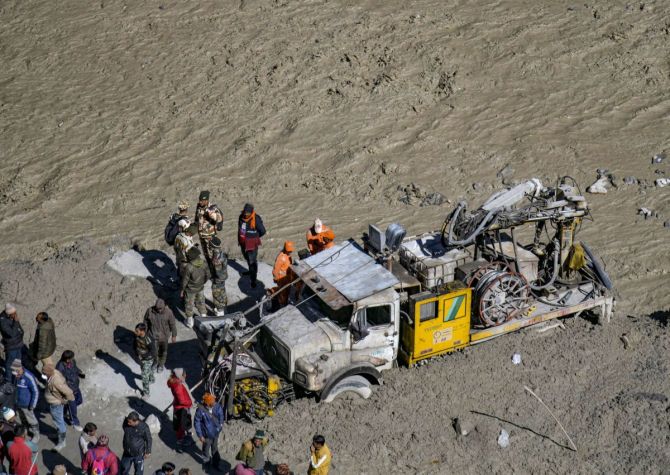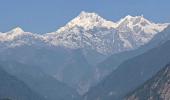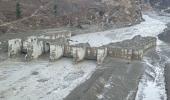Twenty-six bodies have been recovered and 171 people still missing after the Uttarakhand disaster apparently caused by a glacier burst, officials said Monday, as multiple agencies worked at rescuing over 30 workers feared trapped in a tunnel at a power project site.

Officials at the State Emergency Operation Centre said 197 people are still missing, a day after a portion of the Nanda Devi glacier possibly burst through its banks in Chamoli district.
It appeared to have triggered an avalanche and a deluge that ripped through the Alaknanda river system in the upper reaches of the ecologically fragile Himalayas.
Experts, however, are still trying to determine the exact cause of the disaster in Joshimath.
"It was due to lakhs of metric tonnes of snow sliding down abruptly from a trigger point on top of a naked hill," Uttarakhand chief minister Trivendra Singh Rawat told reporters after meeting ISRO scientists.
After a comprehensive analysis is undertaken to find out the reasons, "we will build an elaborate plan to avert any potential tragedy going forward", he said in an interview to PTI.

Prime Minister Narendra Modi assured a delegation of Uttarakhand MPs of his government's support to the people of the state and said it is working to strengthen infrastructure there to deal with any natural disaster in future.
The missing people include those working at the hydel power project sites and villagers whose homes nearby were washed away, officials said.
Two power projects -- NTPC's 480 MW Tapovan-Vishnugad project and the 13.2 MW Rishiganga Hydel Project -- were extensively damaged with scores of labourers caught in tunnels as the waters came rushing in.
Thirteen villages are cut off due to the damage to roads and bridges, Uttarakhand Director General of Police Ashok Kumar said.
Essential food supplies are being sent there by helicopters.

Rescue efforts in the affected areas near Joshimath, about 295 km from here, gained momentum with teams of the Army, Indo-Tibetan Border Police, National Disaster Response Force and State Disaster Response Force coordinating to rescue 30-35 people feared trapped in a tunnel at the Tapovan-Vishnugad project.
More teams have been sent to the site on Mi-17 helicopters that landed at the helipad in Joshimath, NDRF chief S N Pradhan said in a Twitter post.
Some teams from the Army, including from the Medical Corps, also reached the disaster spot, an official supervising the operation said.
Sniffer dogs and heavy mechanical equipment, including bulldozers and JCBs, were deployed.

Officials said 27 people were rescued alive. Of these, 12 were saved from the smaller of the two tunnels at the Tapovan-Vishnugad project site and 15 from the Rishiganga site.
Uttarakhand Director General of Police Ashok Kumar added that efforts were focused on rescuing 30-35 labourers trapped in a 250-metre tunnel at Tapovan.
The work was complicated as the tunnel is slightly curved, making it difficult to clear the debris and silt blocking it.
The entire landscape was coloured a sandy grey, many structures swept away and buried under piles of silt.

"Our teams worked overnight to rescue about 30 workers who are trapped in the tunnel. Specialised equipment for such operations has been deployed. We are hopeful we will able to rescue everyone," ITBP spokesperson Vivek Kumar Pandey told PTI in Delhi.
"There is a huge amount of debris inside the tunnel. About 80 metres inside the tunnel is cleared and accessible, and it looks like about 100 more metres of debris will have to be cleared," he added.
Pandey said nearly 300 ITBP personnel are deployed at the site.
In a video provided by the ITBP, a team of senior officials was seen analysing the tunnel's map to find the best way of approach.

The tunnel has only one entry, an official said.
Global warming or maybe a Western disturbance bringing fresh snow that melted could have triggered the deluge, experts said.
The Snow and Avalanche Study Establishment of the Defence Research and Development Organisation is among those investigating the disaster.

It is not clear whether the flood was a typical Glacial Lake Outburst Flood or some temporary damming due to a landslide and avalanche that might have blocked the mainstream to form a temporary lake which burst, said Ranjit Rath, director general of the Geological Survey of India.
Union ministers Ramesh Pokhriyal Nishank and R K Singh as well as Pauri MP Tirath Singh Rawat, Uttarakhand minister Dhan Singh Rawat met the affected families in disaster-hit Tapovan and Raini.

Congress leader Rahul Gandhi also expressed solidarity.
With no clarity on what led to the disaster and some experts pointing to climate change, scientists also headed to Chamoli to understand what had happened.
Three of those rescued on Sunday evening were admitted to the ITBP hospital at Joshimath, nearly 25 km from the Tapovan power project site, as they were feeling uneasy, officials said. They are stable now.

The state government released Rs 20 crore to Chamoli district for rescue and relief operations.
UN Secretary General Antonio Guterres said the United Nations stands ready to contribute to the rescue and assistance efforts if necessary.
"The Secretary-General is deeply saddened by the reported loss of life and dozens missing following the glacier burst and subsequent flooding in Uttarakhand state, India, on Sunday," his spokesperson said.











 © 2025
© 2025